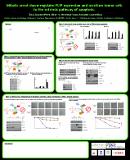Por favor, use este identificador para citar o enlazar a este item:
http://hdl.handle.net/10261/123814COMPARTIR / EXPORTAR:
 SHARE
BASE SHARE
BASE
|
|
| Visualizar otros formatos: MARC | Dublin Core | RDF | ORE | MODS | METS | DIDL | DATACITE | |

| Campo DC | Valor | Lengua/Idioma |
|---|---|---|
| dc.contributor.author | López-Rivas, Abelardo | - |
| dc.contributor.author | Medema, René H. | - |
| dc.contributor.author | Sánchez-Pérez, Tania | - |
| dc.date.accessioned | 2015-10-26T10:11:48Z | - |
| dc.date.available | 2015-10-26T10:11:48Z | - |
| dc.date.issued | 2012-07-15 | - |
| dc.identifier.citation | Gordon Research Conference on Cell Death (2012) | - |
| dc.identifier.uri | http://hdl.handle.net/10261/123814 | - |
| dc.description.abstract | Cell cycle deregulation is a feature of tumor cells. Most of the current therapeutic (A) MDA-MB231 (B) HeLa strategies are based on the perturbation of the cell cycle, especially during mitosis. “Antimitotic drugs” perturb the correct assembly of the mitotic spindle triggering the activation of the spindle assembly checkpoint (SAC), which results in a mitotic arrest and eventually, cell death. However, sometimes cells go out of mitosis by “slippage”, being one of the main mechanism of resistance to these treatments. We have already reported that microtubule poisons treatment sensitizes tumor cells to TRAIL- induced apoptosis and also that FLIP down-regulation induced by these treatments is the key event in this sensitization. In this study we demonstrate that both FLIP down-regulation and sensitization to TRAIL- induced apoptosis are induced by mitotic arrest independently of checkpoint activation. Moreover, although targeting mitotic exit has recently been proposed as a better strategy to kill tumor cells than conventional anti-mitotic drugs, we have observed that treatments based on combination of mitotic arrest-inducing regimes with TRAIL are much more effective against tumor cells, highlighting the potential therapeutic benefit of the use of this combination against tumor cells. Finally, we show that CDK1/Cyclin B complex, but no other mitotic kinases, seems to have a role in FLIP down-regulation, as FLIP levels inversely correlate with CDK1 activity in mitosis. | - |
| dc.relation.isversionof | Publisher's version | - |
| dc.rights | openAccess | - |
| dc.title | Mitotic arrest down-regulates FLIP expression and sensitizes tumor cells to the extrinsic pathway of apoptosis | - |
| dc.type | póster de congreso | - |
| dc.date.updated | 2015-10-26T10:11:48Z | - |
| dc.description.version | Peer Reviewed | - |
| dc.language.rfc3066 | eng | - |
| dc.relation.csic | Sí | - |
| dc.type.coar | http://purl.org/coar/resource_type/c_6670 | es_ES |
| item.openairecristype | http://purl.org/coar/resource_type/c_18cf | - |
| item.fulltext | With Fulltext | - |
| item.cerifentitytype | Publications | - |
| item.openairetype | póster de congreso | - |
| item.grantfulltext | open | - |
| Aparece en las colecciones: | (CABIMER) Comunicaciones congresos | |
Ficheros en este ítem:
| Fichero | Descripción | Tamaño | Formato | |
|---|---|---|---|---|
| Mitotic arrest down-regulates_SánchezPérez.pdf | 1,63 MB | Adobe PDF |  Visualizar/Abrir |
CORE Recommender
Page view(s)
169
checked on 18-abr-2024
Download(s)
195
checked on 18-abr-2024
Google ScholarTM
Check
NOTA: Los ítems de Digital.CSIC están protegidos por copyright, con todos los derechos reservados, a menos que se indique lo contrario.
